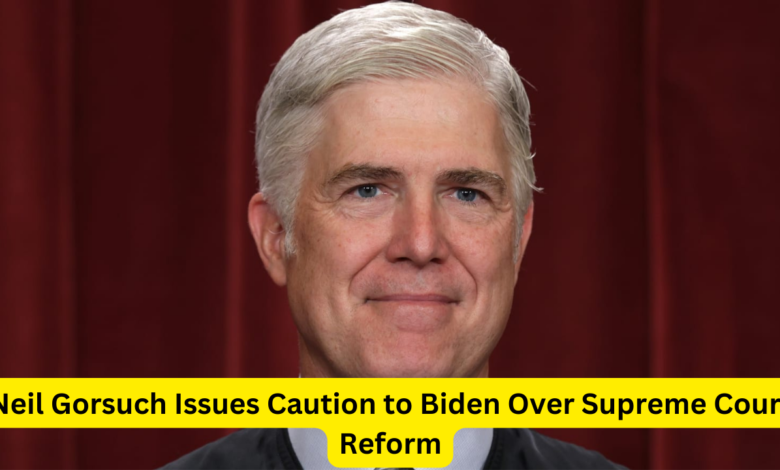Neil Gorsuch Issues Caution to Biden Over Supreme Court Reform

Neil Gorsuch warns President Joe Biden to be cautious with his proposed reforms to the Supreme Court. Discover Gorsuch’s response and implications for future judicial changes.. In a recent interview, Justice Neil Gorsuch expressed his concerns about President Joe Biden’s proposed reforms to the Supreme Court, urging caution and underscoring the potential ramifications of such sweeping changes. This article explores the key points of Gorsuch’s warning, the broader context of Supreme Court reforms, and the implications for the future of American jurisprudence.
Gorsuch’s Cautionary Remarks
Justice Neil Gorsuch’s recent comments regarding President Biden’s proposals for Supreme Court reforms have drawn significant attention. During an interview with Fox News’ Shannon Bream, Gorsuch emphasized the importance of approaching such reforms with careful consideration. He noted, “You’re not going to be surprised that I’m not going to get into what is now a political issue during a presidential election year. I don’t think that would be helpful.”
This statement highlights Gorsuch’s reluctance to engage in political debates concerning the Court’s structure during an election year, reflecting a broader concern about the potential politicization of judicial reforms.
Understanding the Proposal
President Biden’s proposal for Supreme Court reform includes several key elements aimed at altering the current structure of the judiciary. Among the most discussed aspects are the expansion of the number of justices and changes to the confirmation process. These proposals have sparked considerable debate, with critics arguing that they could undermine the Court’s independence and integrity.
Gorsuch’s warning is particularly significant in this context, as it reflects a concern about maintaining the judicial system’s impartiality and avoiding actions that could be perceived as politically motivated.
Implications of Reform
Impact on Judicial Independence
One of the primary concerns raised by Justice Gorsuch is the potential impact of reform on judicial independence. The Supreme Court’s role in the American legal system is to provide an impartial interpretation of the Constitution and federal laws. Any changes that could be seen as politically motivated might erode public trust in the Court’s ability to perform this function effectively.
Historical Context
To fully understand Gorsuch’s warning, it is essential to consider the historical context of Supreme Court reforms. Throughout American history, there have been various attempts to alter the Court’s structure, often driven by political motivations. For example, President Franklin D. Roosevelt’s court-packing plan in the 1930s was a highly controversial attempt to increase the number of justices, which ultimately failed but left a lasting impact on the debate over judicial reform.
Public Perception
The public perception of the Supreme Court is crucial to its functioning. If reforms are perceived as politically motivated, they could undermine the Court’s legitimacy in the eyes of the public. Gorsuch’s comments reflect a concern that any such perception could have long-term consequences for the Court’s authority and effectiveness.
Gorsuch’s Perspective on Reform
Judicial Stability
Justice Gorsuch has emphasized the importance of judicial stability and continuity. In his remarks, he suggested that reforms should be approached with caution to avoid destabilizing the Court’s established practices and precedents. Stability is essential for maintaining the rule of law and ensuring that legal principles are consistently applied.
Avoiding Political Pitfalls
Gorsuch’s reluctance to engage in political discussions about the reform proposals underscores a broader concern about the potential politicization of the judiciary. He warns that reforms driven by political considerations could compromise the Court’s ability to function impartially and uphold the Constitution.
Future Prospects
Ongoing Debate
The debate over Supreme Court reform is likely to continue as different stakeholders express their views on the proposed changes. While some argue that reform is necessary to address perceived imbalances or inefficiencies, others, including Gorsuch, caution against actions that could undermine the Court’s independence.
Potential Compromises
In light of Gorsuch’s warning, it is possible that future discussions about reform will focus on finding a balance between necessary changes and preserving the Court’s integrity. Compromise solutions that address specific concerns without fundamentally altering the Court’s structure may be a way forward.
Conclusion
Justice Neil Gorsuch’s warning to President Biden serves as a reminder of the importance of maintaining judicial independence and avoiding politically motivated reforms. As the debate over Supreme Court reform continues, it is crucial for all stakeholders to consider the long-term implications of proposed changes and strive for solutions that uphold the integrity of the judiciary.




